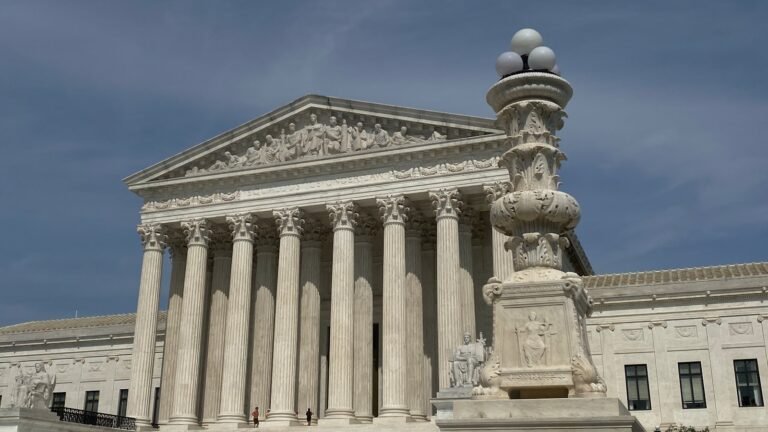
Baltimore, MD – Maryland’s Attorney General Anthony G. Brown has become part of a multistate coalition that is suing the Trump administration. This lawsuit targets the U.S. Department of Health and Human Services (HHS) for allegedly sharing personal Medicaid information unlawfully with the Department of Homeland Security (DHS), which includes Immigration and Customs Enforcement (ICE). The case has been filed in the U.S. District Court for the Northern District of California and aims to prevent the federal government from continuing these actions, which the attorneys general claim breach federal law and undermine public confidence in the healthcare system.
The Allegations: Unauthorized Sharing of Sensitive Health Data
The essence of the lawsuit centers on HHS’s choice to grant DHS access to sensitive Medicaid information, which includes the personal health records of millions of individuals throughout the United States. The lawsuit claims that the actions of the Trump administration jeopardize the long-standing safeguards that have ensured the confidentiality of Medicaid data, which has been used solely for the administration of the program.
Medicaid, an essential healthcare initiative launched in 1965, offers coverage to at-risk groups such as low-income individuals, children, pregnant women, the elderly, and those with disabilities. Traditionally, the personal health information of Medicaid recipients has been shielded by federal law, disclosed only under stringent and limited conditions, mainly concerning public health and the integrity of the Medicaid program.
However, in June 2025, reports emerged indicating that HHS had handed over these extremely sensitive Medicaid data files to DHS. The lawsuit contends that this decision to share data was made without any formal acknowledgment or public justification. The coalition asserts that this action breaches the Social Security Act, the Health Insurance Portability and Accountability Act (HIPAA), the Privacy Act, and various other federal laws designed to protect personal health information.
The Impact on Immigrants and Healthcare Access
Central to the lawsuit is the claim that allowing immigration officials to access personal health information will instill fear and uncertainty in immigrants, which may cause them to avoid signing up for Medicaid or seeking emergency healthcare services. This issue is especially alarming in Maryland, where around 1.5 million individuals are enrolled in Medicaid, including a significant number of noncitizens who depend on emergency Medicaid coverage.
“Granting immigration authorities access to personal Medicaid data violates federal law and erodes trust in our healthcare system,” said Attorney General Brown. “Immigrants should not be forced to choose between protecting their families and seeking medical care they are legally entitled to receive. We are acting to defend the privacy of all Marylanders and ensure hospitals aren’t left to bear the burden when patients delay care out of fear.”
Maryland’s Medicaid program has long offered emergency Medicaid coverage to immigrants who meet the program’s criteria. However, Brown expressed concern that this new policy would discourage eligible individuals from accessing necessary healthcare, potentially leading to severe health consequences or even death.
A Broader Threat to Public Health and State Resources
The lawsuit contends that the actions taken by the Trump administration will lead to significant repercussions that extend beyond the direct risks faced by immigrant communities.
The coalition claims that the large-scale transfer of personal information could jeopardize the stability of the Medicaid program, which has played a crucial role in delivering medical services to the country’s most at-risk populations.
Additionally, states might be compelled to bear the financial costs of emergency medical services for those who refrain from seeking care out of fear of immigration enforcement.
“We are filing this lawsuit to protect the integrity of Medicaid and the safety of individuals who are eligible for emergency services,” Attorney General Brown said. “By undermining the trust that immigrants place in the Medicaid program, the Trump administration is putting lives at risk.”
Legal and Constitutional Violations
In its legal filing, the coalition of state attorneys general argues that the Trump administration’s actions are “arbitrary and capricious” and violate the Administrative Procedure Act (APA). Additionally, the lawsuit contends that the actions conflict with the Social Security Act, which governs Medicaid, and the HIPAA protections that safeguard private health information.
The coalition is requesting the court to prevent HHS from transferring Medicaid data to DHS and to halt DHS from using the data for immigration enforcement purposes. The lawsuit seeks to uphold the privacy rights of Medicaid beneficiaries and to ensure that states can continue to administer their healthcare programs without interference from immigration enforcement activities.
Multistate Effort Against Federal Overreach
Attorney General Brown’s lawsuit is part of a broader multistate effort. In addition to Maryland, the attorneys general of California, Arizona, Connecticut, Delaware, Maine, Massachusetts, Michigan, Minnesota, New Jersey, New York, Oregon, Rhode Island, and Washington have joined the case, asserting that the federal government’s actions not only jeopardize the law but also jeopardize public health and undermine the security of state-run Medicaid programs.
“Why does Trump need your medical records—your immunization records, your weight, your cancer diagnosis, your prescriptions—to advance his out-of-control deportation agenda? What is ICE doing with all of this information, and who is watching to make sure this incredibly sensitive information is not misused, lost or leaked? Trump is doing this to bully immigrant families away from seeking healthcare, and it’s making all of us less healthy and less safe. We’re suing today to stop this,” said Connecticut Attorney General Tong.
“The Trump Administration has upended longstanding privacy protections with its decision to illegally share sensitive, personal health data with ICE. In doing so, it has created a culture of fear that will lead to fewer people seeking vital emergency medical care,” said California Attorney General Bonta. “I’m sickened by this latest salvo in the President’s anti-immigrant campaign. We’re headed to court to prevent any further sharing of Medicaid data — and to ensure any of the data that’s already been shared is not used for immigration enforcement purposes.”
“This has a chilling impact on people who need healthcare in our country,” Attorney General Dan Rayfield said. “Parents may choose not to take their kids to the doctor because they’re afraid of what may happen. We need to protect the privacy and dignity of every person who calls Oregon home.”
“Washington residents expect that the confidential information they give to the government to access medical treatment will only be used for healthcare purposes,” said Washington Attorney General Nick Brown. “Their data should not go towards creating a giant database of Americans’ personal information or used so that ICE can deport undocumented immigrants because they had to go to the doctor.”
“The Trump Administration’s use of Washingtonians’ private health information for its own political agenda is outrageous. This is a violation of trust for everyone whose data was inappropriately shared, but especially our immigrant communities and mixed-status families, who are already being targeted by the Trump Administration. We will stand up for the dignity and right to privacy of all Washingtonians,” said Washington State Governor Bob Ferguson.
The Future of Medicaid and Public Trust
The result of this lawsuit may have far-reaching effects on the future of Medicaid and the safeguarding of personal health information.
If the lawsuit prevails, it will prevent the Trump administration’s policy from taking effect and reinforce the legal safeguards for the personal data of Medicaid beneficiaries.
As the case progresses, the coalition of states will persist in advocating for the privacy and rights of those enrolled in Medicaid, making sure that federal policies do not disrupt access to essential healthcare or compromise the integrity of the program.



